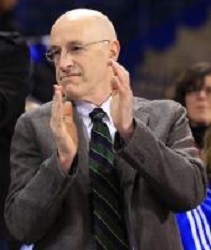In the nineteenth century, mathematician Charles Babbage designed a programmable calculating machine that could execute algorithms with an accuracy and speed surpassing human abilities. Though Babbage’s mechanical computer remained unbuilt during his lifetime, his interest in developing machine intelligence anticipated twenty-first-century concerns about the promises, limitations, uses, and misuses of machine-generated data. This lecture will consider how our conceptions of thinking machines have evolved over the past 200 years and what issues may arise in the future. What does it mean to imagine machines “thinking”? What avenues are made available to us by the power of machine mathematics? And in what ways do calculating machines challenge our sense that human cognition is an exceptional phenomenon?
Guest speakers: Fiona Coll (English) and E. Bruce Pitman (Math)
Fiona Coll
Fiona Coll is an Assistant Professor of Literature and Technology at SUNY Oswego. Her work explores the mutual constitution of machine intelligence and human agency in the new mechanical age of the nineteenth century. She is working on a book project about the appearance and function of the automaton in nineteenth-century fictional, scientific, and political writing. Her writing can be found in Victorian Review, University of Toronto Quarterly, and at The Floating Academy. E.
Bruce Pitman

Bruce Pitman holds a bachelor’s degree in physics and mathematics from Northwestern University and earned a Ph.D. in mathematics from Duke University in 1985. His work at UB is marked by academic research and development of new and innovative graduate and undergraduate programs. He is the author or co-author of more than 70 papers and has been principal investigator or co-investigator on more than $10 million in research and equipment awards. He has conducted research in mathematical biology and in the field of granular materials; his recent work involves the modeling, computation and analysis of geophysical mass flows.
St. Jerome's University
University of Waterloo, Faculty of Arts
University of Waterloo, Faculty of Mathematics
Fields Institute